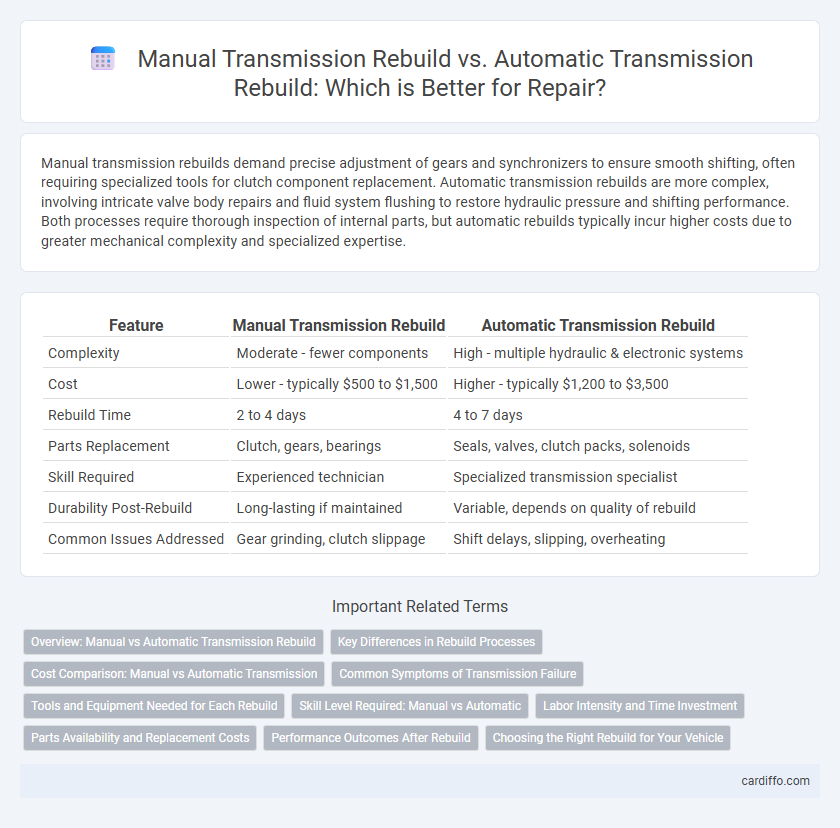Manual transmission rebuilds demand precise adjustment of gears and synchronizers to ensure smooth shifting, often requiring specialized tools for clutch component replacement. Automatic transmission rebuilds are more complex, involving intricate valve body repairs and fluid system flushing to restore hydraulic pressure and shifting performance. Both processes require thorough inspection of internal parts, but automatic rebuilds typically incur higher costs due to greater mechanical complexity and specialized expertise.
Table of Comparison
| Feature | Manual Transmission Rebuild | Automatic Transmission Rebuild |
|---|---|---|
| Complexity | Moderate - fewer components | High - multiple hydraulic & electronic systems |
| Cost | Lower - typically $500 to $1,500 | Higher - typically $1,200 to $3,500 |
| Rebuild Time | 2 to 4 days | 4 to 7 days |
| Parts Replacement | Clutch, gears, bearings | Seals, valves, clutch packs, solenoids |
| Skill Required | Experienced technician | Specialized transmission specialist |
| Durability Post-Rebuild | Long-lasting if maintained | Variable, depends on quality of rebuild |
| Common Issues Addressed | Gear grinding, clutch slippage | Shift delays, slipping, overheating |
Overview: Manual vs Automatic Transmission Rebuild
Manual transmission rebuilds involve replacing worn gears, synchronizers, and bearings to restore precise driver-controlled shifting, often requiring specialized knowledge of clutch systems. Automatic transmission rebuilds focus on repairing complex hydraulic systems, valve bodies, and torque converters to ensure smooth, seamless gear changes without driver input. Both processes demand detailed diagnostics and quality parts to maximize transmission longevity and vehicle performance.
Key Differences in Rebuild Processes
Manual transmission rebuilds involve disassembling and inspecting individual components such as gears, synchros, and bearings, requiring precise alignment and manual adjustments for proper gear engagement. Automatic transmission rebuilds focus more on replacing worn clutches, seals, and valve bodies, with an emphasis on hydraulic system function and electronic control module calibration. The complexity of automatic rebuilds typically demands specialized diagnostic tools and greater attention to fluid dynamics compared to the mechanical focus of manual rebuilds.
Cost Comparison: Manual vs Automatic Transmission
Rebuilding a manual transmission generally costs between $1,500 and $3,000, making it more affordable due to fewer complex components. Automatic transmission rebuilds often range from $2,500 to $4,500 because of sophisticated hydraulic systems and electronic controls. Labor costs add significantly to automatic rebuilds, reflecting their increased complexity and time requirements.
Common Symptoms of Transmission Failure
Manual transmission failure often presents with grinding noises during gear shifts and difficulty engaging gears, indicating clutch or synchronizer issues. Automatic transmission failure commonly exhibits slipping gears, delayed engagement, and transmission fluid leaks, which signal internal wear or hydraulic problems. Recognizing these symptoms early is crucial for preventing extensive damage and costly repairs in both transmission types.
Tools and Equipment Needed for Each Rebuild
Rebuilding a manual transmission requires specific tools such as clutch alignment tools, snap ring pliers, and gear pullers to handle the precision components and synchronizers. In contrast, automatic transmission rebuilds demand specialized equipment including transmission jacks, valve body kits, and diagnostic scanners to manage complex hydraulic systems and electronic controls. Both types of rebuilds benefit from torque wrenches and bearing installers, but the intricate nature of automatic transmissions necessitates more advanced, computerized tools.
Skill Level Required: Manual vs Automatic
Manual transmission rebuilds demand higher mechanical skill due to clutch assembly adjustment and precise gear synchronization, requiring hands-on experience with intricate components. Automatic transmission rebuilds involve complex hydraulic systems and electronic controls, necessitating specialized diagnostic tools and knowledge of sensor calibration. Both require advanced technical expertise, but automatic rebuilds typically call for additional training in electronic programming and fluid dynamics.
Labor Intensity and Time Investment
Manual transmission rebuilds demand intensive labor due to intricate clutch and gear synchronization adjustments, typically requiring 8 to 15 hours for completion. Automatic transmission rebuilds involve complex hydraulic systems and electronic controls, often extending labor time to 12 to 20 hours. Time investment varies with vehicle make and model but generally, automatic rebuilds require more specialized tools and longer diagnostic procedures.
Parts Availability and Replacement Costs
Manual transmission rebuilds generally benefit from more readily available parts due to simpler design and widespread use in certain vehicle types, often resulting in lower replacement costs. Automatic transmission rebuilds require specialized components, such as hydraulic control units and intricate electronic sensors, leading to higher parts scarcity and increased expenses. Repair shops typically charge more for automatic rebuilds because of the complex assembly and the necessity for expensive, precision parts.
Performance Outcomes After Rebuild
Manual transmission rebuilds typically result in sharper, more direct gear shifts, enhancing driver control and overall vehicle responsiveness. Automatic transmission rebuilds, while improving smoothness and consistency in shifting, may experience a slight delay compared to manual systems, affecting immediate throttle response. Performance outcomes after rebuild largely depend on the quality of parts and precision in assembly, with manual transmissions generally favored for racing applications due to their direct engagement.
Choosing the Right Rebuild for Your Vehicle
Manual transmission rebuilds require precise gear synchronization and clutch assembly repairs, making them ideal for vehicles with simpler mechanical systems and those seeking improved control. Automatic transmission rebuilds involve complex valve body servicing and hydraulic system restoration, suited for vehicles with advanced electronics and smoother shifting demands. Selecting the right rebuild depends on your vehicle's transmission type, driving habits, and long-term reliability goals.
Manual transmission rebuild vs automatic transmission rebuild Infographic

 cardiffo.com
cardiffo.com